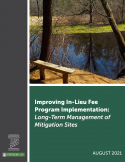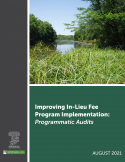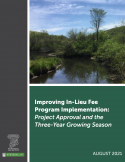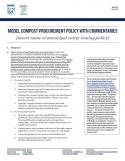
Research Reports
ELI publishes Research Reports available for free download that present the analysis and conclusions of the policy studies ELI undertakes to improve environmental law and policy. These reports contribute to education of the profession and disseminate diverse points of view and opinions to stimulate a robust and creative exchange of ideas. Those publications, which express opinions of the authors and not necessarily those of the Institute, its Board of Directors, or funding organizations, exemplify ELI’s commitment to dialogue with all sectors.
This resource is part of a series of comprehensive guides on some of the most challenging components of ILF program implementation identified through extensive research and interviews with operating ILF programs and other mitigation stakeholders. These guides help address perennial problems for ILF programs by identifying specific challenges, providing detailed recommendations on ways to meet these challenges, and including examples or case studies of programs to illustrate effective approaches to implementation.
Read More >
This resource is part of a series of comprehensive guides on some of the most challenging components of ILF program implementation identified through extensive research and interviews with operating ILF programs and other mitigation stakeholders. These guides help address perennial problems for ILF programs by identifying specific challenges, providing detailed recommendations on ways to meet these challenges, and including examples or case studies of programs to illustrate effective approaches to implementation.
Read More >
This resource is part of a series of comprehensive guides on some of the most challenging components of ILF program implementation identified through extensive research and interviews with operating ILF programs and other mitigation stakeholders. These guides help address perennial problems for ILF programs by identifying specific challenges, providing detailed recommendations on ways to meet these challenges, and including examples or case studies of programs to illustrate effective approaches to implementation.
Read More >
Climate change and food waste are two key challenges faced by municipalities across the country. Cities are on the front lines of efforts to mitigate and adapt to the impacts of climate change. They are also responsible for managing increasing volumes of solid waste and feeding the growing number of food insecure members of their communities. While cities are making headway in addressing both of these intractable challenges, many are missing a key opportunity to address them simultaneously—in their climate action plans.
Read More >
Composting is part of a holistic approach to reducing municipal food waste that also includes food waste prevention and rescue of surplus food. By turning food scraps into a natural soil amendment that can be used in city gardens and landscaping and improve soil health and water retention without the use of artificial fertilizers, composting provides myriad benefits, including reducing greenhouse gas emissions by diverting organic materials away from landfills where they emit methane.
Read More >